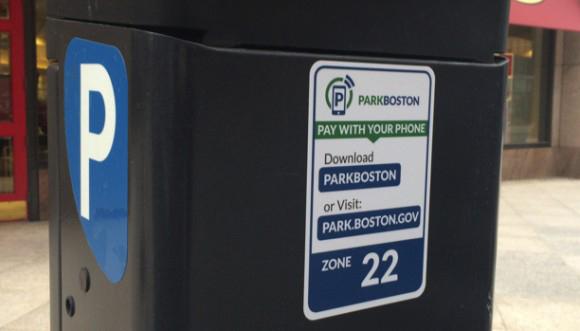
For decades, it was a much-maligned ritual of city living: digging in purses, pants, or under car seats for stray quarters to feed the insatiable parking meter. And then, all too often, returning to find a bright orange ticket saluting from under a windshield wiper.
Could it all be a thing of the past?
The arrival of the ParkBoston app — coupled with the ability to swipe a credit card at parking meters — has sparked a civic triumph not quite as grand as a sports championship but certainly more durable: The city of Boston is issuing fewer parking tickets and collecting more in parking meter revenue.
The app was introduced in some parts of the city in January 2015, and city figures show that tickets for expired or unpaid meters dropped 10 percent from fiscal year 2014 to the next budget year.
Meantime, revenue collected through meters and the new app is projected to climb to $15.5 million in the current budget year, compared with just under $14 million the year before, city transportation officials said.
Will an increase in meter revenue even make up for what’s lost by writing fewer tickets? It’s quite possible. City officials said they can’t reach a firm conclusion, but a Globe review of preliminary figures suggests the decrease in ticket fees and the increase in meter receipts pretty much cancel each other out.
The ParkBoston App has been a boon for Nick Collins, a 25-year-old motorist from Malden who said it has saved him time, money, and the dreaded prospect of returning to his car to find a ticket.
“I use it all the time,’’ said Collins, as he dropped off his girlfriend on Commonwealth Avenue this month. “It’s so convenient.’’
When drivers pull into a spot, instead of rifling for quarters, they simply pull out their smartphone or iPad. The app, which stores credit card information, can be used to pay for a metered street space for up to four hours in some spots. Downloading the app is free, but a 15-cent fee applies to each transaction.
The app can be used at all of the city’s 8,000 metered spaces. To date, city officials said, there have been 219,000 downloads of the app and 2.1 million transactions.
A popular feature is a reminder, which sounds like a horn, that goes off when meter time is about to expire, allowing drivers to add time on the app.
“I teach a class down the block,’’ said Susan Foster, a Boston University professor who commutes from Jamaica Plain, as she prepared to pull into a spot last week. “If a student wants to talk after class, I can look at the phone and see how much time I have left and add more minutes. Plus, I don’t have to carry around a whole bunch of quarters.’’
The city’s transportation commissioner, Gina Fiandaca, said that over the past eight years, the Boston Transportation Department has established several payment options that enhance the “user experience’’ and contribute to decreasing violations.
In 2008, the city installed kiosks in designated areas such as Newbury Street and North Station that allow drivers to use their credit cards to pay for parking.
A parking-meter card program, which was launched in 2012 and has since been phased out, allowed drivers to prepay for parking.
In February, officials upgraded the city’s antiquated parking meters with new “smart meters,’’ which take credit cards as well as quarters and can be paid through the ParkBoston App.
“As you are able to pay the meter at a consistent rate, you are less likely to get a parking ticket for having failed to pay that meter,’’ Fiandaca said. “The more options we can provide to people to pay the meter . . . people are more likely to pay.’’
City officials said parking meter revenue had held steady at $13 million to $14 million annually since 2010, with a pair of exceptions. In 2012, the revenue spiked to $15.5 million because of an increase in parking meter fees from $1 to $1.25 per hour and the launch of the prepaid meter card, transportation officials said.
Parking meter revenue and meter violations hit a low in 2015, largely because of winter weather that blocked patrons from accessing meters, transportation officials said.
Chris Osgood, the city’s chief of streets, said there is a correlation between declining violations and easy-payment options now available to drivers.
“Ultimately, our goal is to get compliance,’’ he said. “In general, what we’d like to see is that healthy turnover at the curb and people paying their meter.’’
That seems to be happening: From the 2014 fiscal year to the following year, the city issued 46,073 fewer meter violation tickets (from 453,435 to 407,362).
The city is forgiving of drivers who use the app incorrectly. The city dismissed 4,231 parking tickets because of ParkBoston user login errors between July 1 and Dec. 31, 2015, a transportation department spokeswoman said.
Parking officials have been reaching out to users to review the app instructions and prevent additional tickets, the officials said.
But for some drivers, habits are hard to break.
David Backus, a Boston University administrator, returned to his car after a meeting to find a ticket under his windshield wiper.
He had plunked quarters into the meter, paying for one hour and 40 minutes, and went to the meeting. He still had 20 minutes left when he got back to his car near Kenmore Square last week.
“The meter reader didn’t do the job right,’’ he said.
Squinting in the sunlight, he used his phone to snap pictures of the meter to show he had time remaining — proof he will need to dispute the ticket.
Meghan E. Irons can be reached at meghan.irons@globe.com. Follow her on Twitter @meghanirons.



